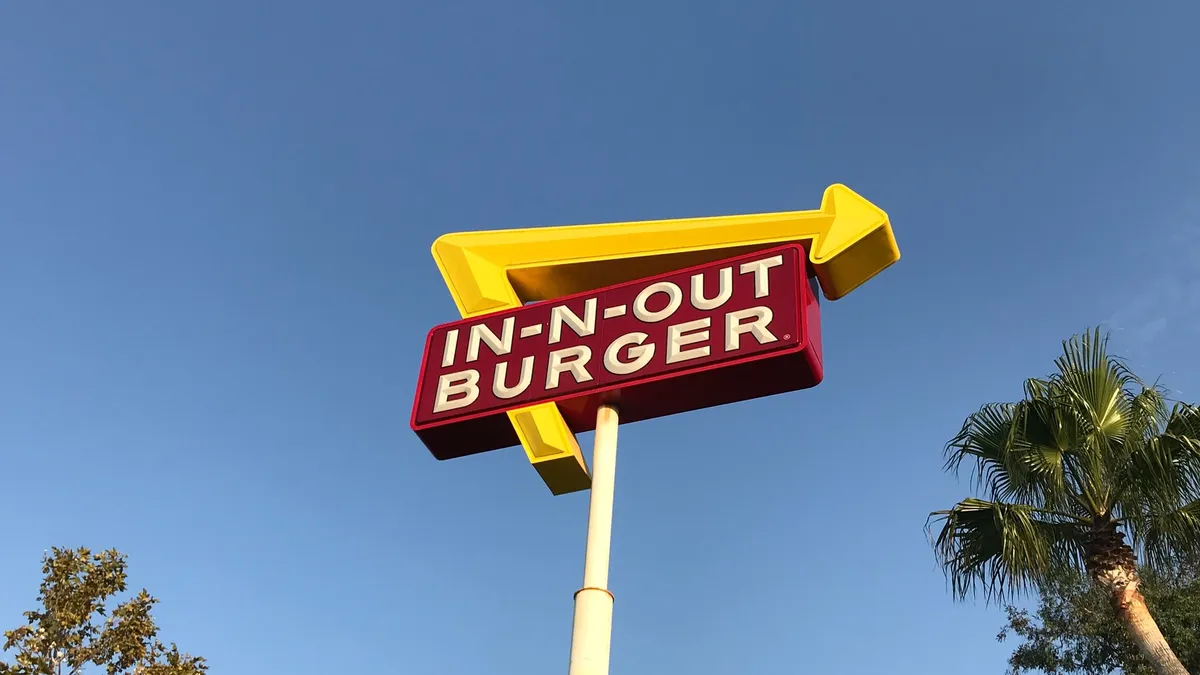Dive Brief:
- In-N-Out Burger's two Colorado locations in Colorado Springs and Aurora have reported more than 140 COVID-19 cases since mid-December, according to The Denver Gazette. The Aurora restaurant has reported at least 20 new cases for two straight weeks and now reports 62 cases total. The Colorado Springs location now has 83 cases, adding just three cases since last week.
- Colorado's Department of Public Health and Environment said it is the local health departments' decision to close the restaurants or not. Both of the counties the restaurants are located in told the publication there are no plans to temporarily close either location, though the restaurants could ultimately make the decision to do so.
- The viral spread at these In-N-Out locations is the largest among restaurants in the state since the pandemic began in March, though there are larger active outbreak in the state's prisons, the Gazette reports.
Dive Insight:
The U.S. continues to set a record for the most COVID-19 cases in the world, reporting 21.3 million this week, so pinpointing these outbreaks as starting at these two specific restaurants could pose a major challenge. A spokesperson for El Paso County told the Gazette that In-N-Out is adhering to cleaning, disinfecting and employee-screening protocols and added that recommendations to close are given when "transmission within the facility is identified."
After eight employees at a Texas pizza restaurant recently tested positive, for example, contact tracing discovered they socialize outside of work, leading the local health department to declare that the outbreak was not workplace related.
The CDC has indicated that businesses "in most cases" do not need to shut down when an employee tests positive, but suggests restaurants should work with state and local health officials to receive up-to-date and accurate information about the correct response. Still, many restaurants have erred on the side of caution, voluntarily and temporarily closing after positive tests were detected among staff or customers. McDonald's, for example, said it temporarily closes its restaurants when employees test positive to bring in a certified third-party company to provide a thorough cleaning.
The National Restaurant Association recommends seven steps to follow when an employee tests positive, including making sure that employee is quarantined, implementing contact tracing, notifying health officials, cleaning/disinfecting and permitting the return to work. Again, there is no recommendation to temporarily close.
Restaurant workers face a particular risk as they tend to work in close proximity — particularly back of house. More than 1,000 restaurant employees in Colorado may have been infected on the job as of mid-December, which is three times the average number of potential infections per workplace among nearly 70 other job sites with COVID-19 outbreaks tracked by the state, The Wall Street Journal reports. Restaurant chains have navigated a number of OSHA complaints related to a lack of coronavirus safety measures, and workers at both McDonald's and Taco Bell have alleged coronavirus deaths among employees.
If temporary closures aren't a suitable solution when outbreaks arise, particularly for restaurants already struggling with compromised capacities and sales, additional protocols may be necessary to keep this workforce and its customers safe. In Philadelphia, for example, restaurants now have access to frequent and free COVID-19 testing inside a closed local restaurant. The testing allows restaurants to quickly control an outbreak and save money on testing if a COVID outbreak occurs, according to one operator.











